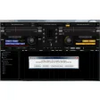Virtual rehearsal studio for musicians
Virtual rehearsal studio for musicians
Pros
- Free, open-source platform
- Low-latency audio for real-time collaboration
- Ability to create private servers
- User-friendly interface
- Supports community interaction with public servers
Cons
- Initial setup may be technical for some users
- Requires wired internet connection for optimal performance
- May require additional hardware (sound card with ASIO)
- Bandwidth competition can affect performance
Jamulus: Virtual Rehearsal Room for Musicians
Overview of Jamulus
Jamulus emerges as an innovative software solution dedicated to musicians looking to rehearse, perform, or jam with others over the internet. Developed by Volker Fischer alongside contributions from the GitHub community, Jamulus breaks the geographical barriers that may prevent musicians from collaborating in real-time. This utility software is especially notable for its high-quality, low-latency audio performance, which mimics the experience of playing together in the same room.
Installation and Setup
Getting started with Jamulus requires a few technical steps, particularly for Windows users. The prerequisite for a smooth Jamulus experience is the installation of an ASIO driver, such as ASIO4ALL, which is essential for low-latency audio processing. Users with sound cards that have a native ASIO driver will benefit from even better performance. After installing the necessary drivers, users can proceed to download and install Jamulus. In the event of a SmartScreen warning, one can safely bypass it with the 'More Info' and 'Run Anyway' options to complete the setup of their sound card.
User Experience and Performance
The interface of Jamulus is straightforward, allowing musicians to quickly connect to public servers or set up private ones with invite-only access. The server-centric design of Jamulus encourages a community approach where musicians can find and join sessions with ease.
For the best audio experience, Jamulus recommends the use of a wired broadband connection as opposed to WiFi, which ensures stability and minimizes latency. Additionally, headphones should be used to prevent echoes and feedback, contributing to a clearer sound. Musicians are also advised to close unnecessary programs to limit internet traffic, which can compete with Jamulus for bandwidth, potentially impacting audio quality.
When connecting to servers, those with the lowest ping times are preferred. Servers with an average of 15ms or below are considered ideal, providing consistency and the closest emulation of playing together in person.
Private Server and Customization
For those seeking a more exclusive and controlled environment, Jamulus allows the creation of private servers. This feature is particularly helpful for bands or music groups that want to practice without external interference. The ability to run a bespoke server empowers users to tailor the jamming experience to their specific needs while maintaining privacy.
Final Thoughts
In conclusion, Jamulus is a powerful tool for musicians looking to bridge the gap imposed by distance. With its robust, open-source framework and user-friendly interface, Jamulus stands out as a compelling option for remote collaboration. While users may need to navigate some technical setup and optimize their internet and audio hardware, the reward is a surprisingly effective and engaging virtual rehearsal space.
Pros
- Free, open-source platform
- Low-latency audio for real-time collaboration
- Ability to create private servers
- User-friendly interface
- Supports community interaction with public servers
Cons
- Initial setup may be technical for some users
- Requires wired internet connection for optimal performance
- May require additional hardware (sound card with ASIO)
- Bandwidth competition can affect performance




